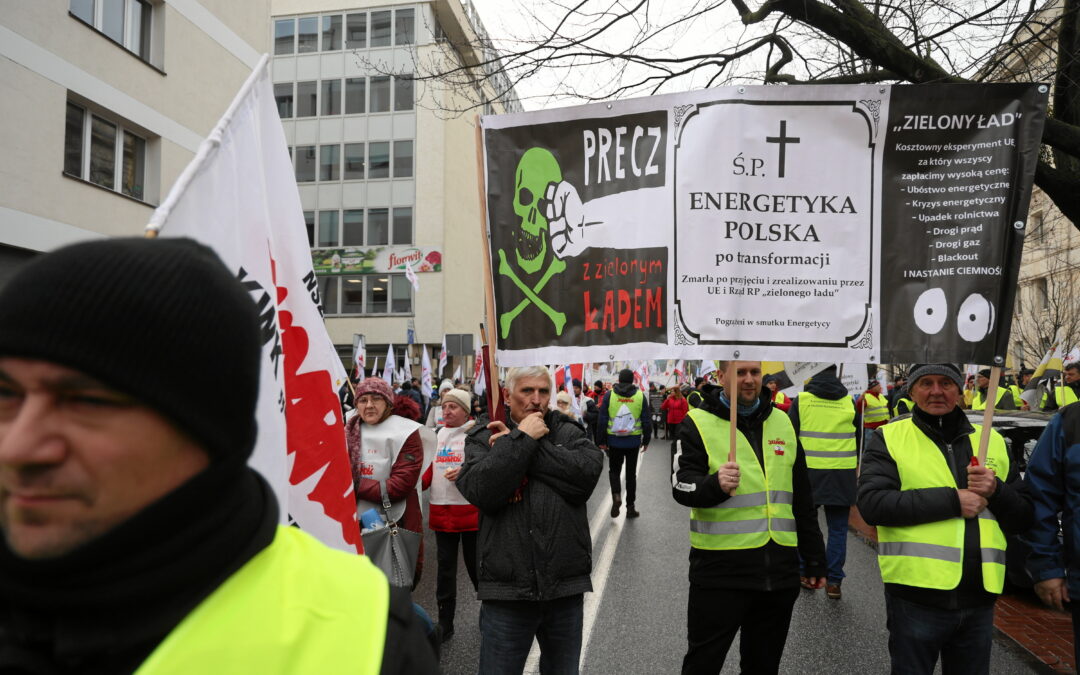Keep our news free from ads and paywalls by making a donation to support our work!

Notes from Poland is run by a small editorial team and is published by an independent, non-profit foundation that is funded through donations from our readers. We cannot do what we do without your support.
Thousands of people joined a protest organised by miners and energy workers in Warsaw on Thursday against plans to shut down coal-fired power plants. They accused the government and state energy firm PGE of threatening their livelihoods in favour of the European Union’s green policies.
Around 5,000 demonstrators – according to the Solidarity trade union that organised the protest – blocked streets in the capital, demanding that the government reverse its decision to decommission three power plants and warning of further action if their calls were ignored.
The protesters also delivered a petition to the PGE headquarters and the state assets ministry, urging the government to uphold agreements that guarantee financial and social support for coal workers.
Protest górników, energetyków przeciwko wyłączaniu bloków węglowych w elektrowniach w 2025 roku. pic.twitter.com/LnKq1QMEW8
— Monika Rutke (@rutkem) January 9, 2025
Last month, PGE announced it will close its coal plant in Rybnik in 2027, five years earlier than expected. Another coal-fired power station in Dolna Odra is expected to shut down by the end of this year, and one in Łaziska is expected to operate no longer than until 2028.
Poland is the European Union’s most coal-reliant country. Last year, coal accounted for 57% of the electricity it produced. However, both the former government, which was in power until 2023, and the current one have pledged to bring that figure down through a combination of nuclear and renewables.
On Thursday, the miners criticised Warsaw’s commitments to the EU’s energy transition policies. They carried banners saying “Polish coal, Polish electricity”. Their protest was joined by farmers, another group that has recently been protesting against the EU’s Green Deal package.
Roland Zagórski, head of a trade union at the Wujek coal mine, told Gazeta Wyborcza that workers are also concerned about the failure to implement promised social support for miners as coal is phased out. “Politicians are good at making election promises, but then they don’t care about mining and miners at all.”
Poland’s coal industry is facing a rapid decline. Coal production, which peaked at 102 million tonnes in 2000, fell to an estimated 45 million tonnes in 2024, the lowest level since 1949, reports Gazeta Wyborcza.
Meanwhile, renewables, in particular wind and solar, have boomed. They accounted for a record 29% of Poland’s energy mix in 2024. Despite this, miners argue that their sector remains essential for energy stability, especially during periods of low wind and solar generation.
While they accept coal’s eventual phase-out (although Poland remains the only country in the EU without a set date for that), they demand extended timelines and economic guarantees, pointing to a 2021 agreement signed by the former government as a key safeguard.
The deal, which outlined a roadmap for closing mines by 2049, included guaranteed employment, severance pay and EU-backed regional development funds. However, analysts warn that the contract may be unsustainable given the plummeting demand for coal.
Poland generated a record 29% of its electricity from renewables in 2024, up from 26% the previous year.
But coal continues to be the main source of power, accounting for almost 57% of Poland's energy mix, the highest proportion in the EUhttps://t.co/B9Uj0uLSxN
— Notes from Poland 🇵🇱 (@notesfrompoland) January 2, 2025
“Subsidies for coal mining could cost taxpayers between 31 billion zloty (€7.3 billion) and 83 billion zloty (€19.5 billion),” according to expert analysis by the Energy Forum think tank. Coal subsidies will cost Warsaw 9 billion zloty this year alone, up from 7 billion zloty in 2024.
The cost of mining coal in Poland is among the highest in the world, at around 820 zloty per tonne of coal produced. By contrast, the figure is 160 zloty per tonne in the United States. The sector employs about 75,000 workers in Poland, according to Industrial Development Agency (ARP) data.
In October, industry minister Marzena Czarnecka defended the government’s approach during an interview with Radio Katowice, stating that the social contract prioritises maintaining employment rather than specific production levels. This would allow miners to receive pay even as mining operations wind down.
Coal miners are being retrained to work in wind farms as part of a programme to help workers leaving mining move to the booming wind sector.
Poland still produces 70% of its power from coal but plans to transition to renewables and nuclear https://t.co/QNJtDFSm1x
— Notes from Poland 🇵🇱 (@notesfrompoland) October 19, 2023

Notes from Poland is run by a small editorial team and published by an independent, non-profit foundation that is funded through donations from our readers. We cannot do what we do without your support.
Main image credit: Robert Kowalewski / Agencja Wyborcza.pl

Alicja Ptak is deputy editor-in-chief of Notes from Poland and a multimedia journalist. She has written for Clean Energy Wire and The Times, and she hosts her own podcast, The Warsaw Wire, on Poland’s economy and energy sector. She previously worked for Reuters.



















